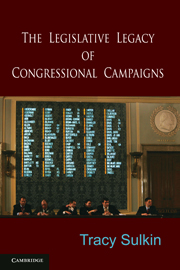Book contents
- Frontmatter
- Contents
- List of Figures
- List of Tables
- Acknowledgments
- 1 Promises to Keep?
- 2 Campaigns as Signals
- 3 Campaign Appeals and Legislative Activity
- 4 Mechanisms Underlying Promise Keeping
- 5 Promise Making and Promise Keeping on Defense and Environmental Issues
- 6 The Who, When, and Where of Follow-through
- 7 The Electoral Implications of Promise Keeping
- 8 Promises and Policy Making
- 9 Representation, Responsiveness, and the Electoral Connection
- References
- Index
6 - The Who, When, and Where of Follow-through
Published online by Cambridge University Press: 05 June 2012
- Frontmatter
- Contents
- List of Figures
- List of Tables
- Acknowledgments
- 1 Promises to Keep?
- 2 Campaigns as Signals
- 3 Campaign Appeals and Legislative Activity
- 4 Mechanisms Underlying Promise Keeping
- 5 Promise Making and Promise Keeping on Defense and Environmental Issues
- 6 The Who, When, and Where of Follow-through
- 7 The Electoral Implications of Promise Keeping
- 8 Promises and Policy Making
- 9 Representation, Responsiveness, and the Electoral Connection
- References
- Index
Summary
The previous chapters have established the general outlines of the extent of the linkages between campaign appeals and legislative activity and their origins. Candidates, particularly for the House, often choose their campaign themes on the basis of their personal interests in and records on them, so their appeals on the campaign trail serve as accurate predictors about what their priorities in office are likely to be. Moreover, the content of legislators' promise-keeping bills aligns closely with the nature of their appeals. And, under certain circumstances, appeals can provide an independent source of information about the content of legislators' future activity, above and beyond what one might glean from an investigation of their past records or policy commitments.
To this point, my analyses have focused on investigating the presence or absence of appeals–activity linkages on an issue-by-issue basis. From a representational perspective, though, we should also be interested in representatives' and senators' promise keeping more generally. In this chapter, I push beyond asking whether those who make a promise about an issue are more active on it or whether there is correspondence between the content of a specific claim and the content of later activity to explore the broader dynamics of promise keeping and its place in legislative behavior. For instance, how much of legislators' agendas are devoted to their campaign themes? Do levels of promise keeping vary greatly across legislators? What explains why some are more attentive to their campaign themes than others?
- Type
- Chapter
- Information
- The Legislative Legacy of Congressional Campaigns , pp. 127 - 151Publisher: Cambridge University PressPrint publication year: 2011



